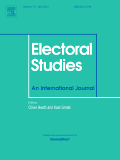New publication by Philippe Mongrain


Philippe published an article in Electoral Studies. In his paper, Philippe uses data from the Making Electoral Democracy Work project to study the determinants of the accuracy of voters’ expectations about the outcome of elections.
Abstract
The expectations of voters regarding election outcomes appear to be mostly influenced by their own political preferences. This raises two important questions. First, once partisan predispositions have been accounted for, how much do other variables like interest in the campaign, election news attentiveness, political knowledge, education or competitiveness help to explain one’s ability at predicting election outcomes? Second, does one’s level of sophistication moderate the link between political preferences and forecasting abilities? To answer these questions, I mobilize data from seven elections taken at the district and (sub)national levels. I also introduce a new measure of forecasting ability—the cumulative Brier score index. In most cases, variables other than preferences and knowledge have little or no influence on the accuracy of voters’ expectations both at the (sub)national and district levels. Political knowledge is positively associated with citizens’ forecasting abilities; however, it does not appear to moderate the preference–expectation link. This result contradicts findings from existing work and holds important implications for the study of citizen forecasting.
You can access the full article here.
This content has been updated on 27 March 2021 at 10 h 23 min.